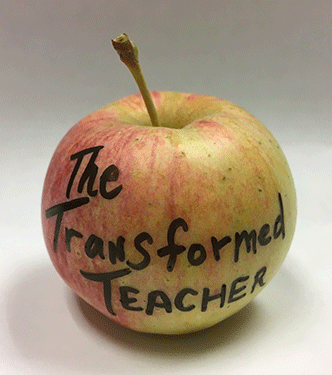THE TRANSFORMED TEACHER – Group work (pt. 1). Let’s get real.

Group work is a four-letter word.
Oh yeah, there’s this one little teeny, tiny thing. Just a weensy, itsy-bitsy issue. Miniscule, really. Most students HATE group work. As in loathe. Worse than an 8:00 am class on Monday. Worse than a 10-page essay exam the day after spring break.
On the other hand, some students love working with their peers. Yay!
But let’s get real.
LOADS of students have negative attitudes toward group work (Pfaff and Huddleston 2003). In my experience, group work often results in… (time warp through complaints, mutiny, emotional outbursts, implosions, meltdowns, etc.) …misery of epic proportion for everyone (as well as nervous tics, ulcers, and premature aging). Ack!
teamwork toxins – gossip, drama, narcissism, blaming, backstabbing, etc.
I hated group projects. Mind you, I didn’t hate my peers (although I did detest their personality disorders that are teamwork toxins – gossip, drama, narcissism, blaming, backstabbing, etc.). Many of my classmates were good friends. Even so, the thought of working together on any kind of class assignment gave me hives.
Why all the fuss?
Is group work really that bad? Can’t we all just get along in our artificially imposed people-pods and turn on our happy faces and good manners to decipher and complete a complex, high stakes task by the deadline? I mean, come on. Why does the mere mention of group work cause my students to become as agitated as an injured fish in the midst of a school of piranhas?
Unsurprisingly, if someone has a bad experience while working in a team, they tend to have a negative attitude toward teamwork (Krug 1997). I call this the ‘once bitten, twice shy phenomenon.’ A person’s attitude toward teamwork is a key factor that affects team effectiveness – i.e., how well the group functions. (But it’s not the only factor).
Why do students have bad attitudes about group work?
Sorensen (1981) identified four reasons why students in her communication class disliked group work: 1) grades, 2) interpersonal considerations, 3) poor outcomes of group work, and 4) group organization factors.
There are oodles of other factors that can affect students’ attitudes toward group work: perception of assessment, communication, psychological safety, common purpose, role clarity, clear goals, accountable interdependence, perceived workload, time in class (or perception of time) dedicated to group work, use of peer evaluations, perception they could do better alone, ‘free-rider’ problems, etc. (Pfaff and Huddleston 2003, Ruiz Ulloa and Adams 2004, Tucker and Abbasi 2016).

Psychologists wouldn’t be surprised by the latter – there’s actually a huge amount of literature dedicated to social loafing (e.g., Harkins 1987). And no, I’m not talking about sharing bread.
So how can teachers make sure group work goes smoothly?
Please stop, my brain is melting.
There is a *little* bit of information out there. Actually, it only took 2 minutes before I went from optimistic ‘I-will-be-a-superstar-teacher’ to so overwhelmed I wanted to stuff each student inside a giant hamster ball and release them into the wild, eliminating group work from my life forever. Seriously, my head just about exploded.
Voluminous tomes, endless journal articles, a bazillion blogs. Where’s a pedagogically-transformed teacher supposed to start?
Well, let’s start with the basics, i.e., what constitutes group work. Contrary to what you might think, it does NOT involve saying, “Hey, work together on this, m’kay?” and furtively surfing the web while students chew their erasers and periodically say things like, “So, do you get it?” and “What’d you put for question two?”
- Cooperative
- Collaborative
- Problem-based
- Team-based
- There are four different types of group learning (Davidson et al. 2014).
We’ll delve into the details and other fun stuff in Group work (pt. 2). Until then,
Chin up!
The Transformed Teacher

The Transformed Teacher is a faculty member who took a bold step out from behind highly detailed lecture notes and a gigantic podium into the teaching-verse, which is a magical place filled with helpful tips, tools, and teachers.
As I learn more about teaching, I find I’m significantly better than I was before, and a lot less neurotic. In fact, sometimes teaching is downright fun. Imagine that.
REFERENCES:
Chalupa MR, Sormunen C, Charles TA. 1997. Student attitudes about experiences with work groups. Delta Pi Epsilon Journal. 39: 197-214.
Davidson N, Major CH, Michaelsen LK. 2014. Small-group learning in higher education – cooperative, collaborative, problem-based, and team-based learning: an introduction by the guest editors. Journal on Excellence in College Teaching. 25: 1-6.
Harkins SG. 1987. Social loafing and social facilitation. Journal of Experimental Social Psychology. 23: 1-18.
Krug J. 1997. Teamwork: why some people don’t like it. Journal of Management in Engineering. 13: 15-16. doi: 10.1061/(ASCE)0742-597X
Pfaff E, Huddleston P. 2003. Does it matter if I hate teamwork? What impacts student attitudes toward teamwork. Journal of Marketing Education. 25: 37-45.
Ruiz Ulloa BC, Adams SG. 2004. Attitude toward teamwork and effective teaming. Team Performance Management. 10: 145-151.
Sorensen S. 1981. Group-Hate: a negative reaction to group work. Paper presented at the Annual Meeting of the International Communication Association (Minneapolis, MN, May 21-25, 1981). https://eric.ed.gov/?id=ED204821
Check out my previous posts:
Justifying just makes life easier.
Say something. Anything. Please…?
Changing educational pain to pleasure.